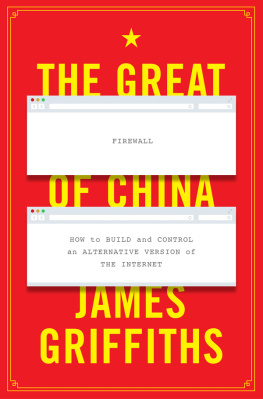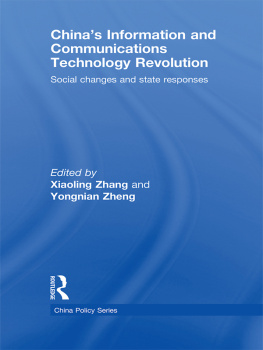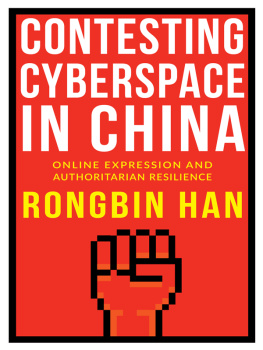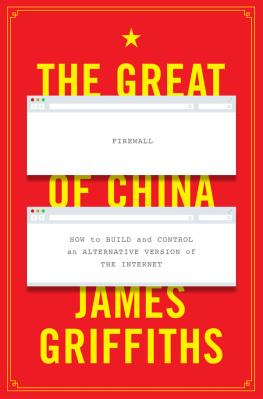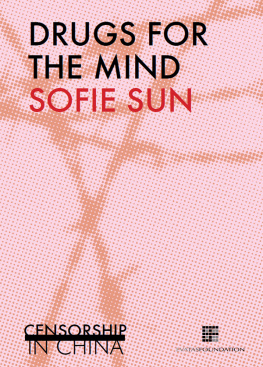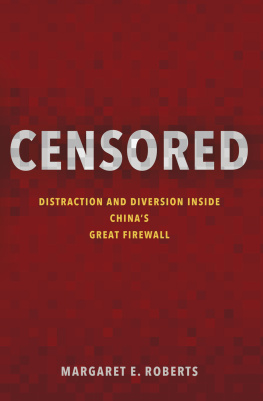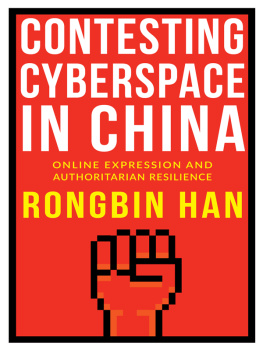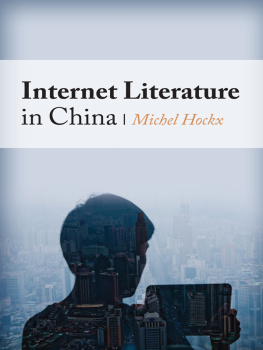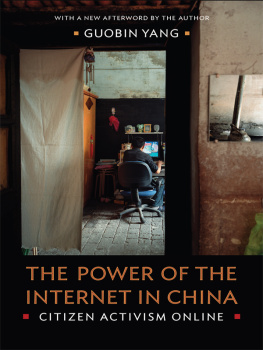
The definitive guide to the development of the internet in China. Griffiths book is also an urgent and much needed reminder about how Chinas quest for cyber sovereignty is undermining global Internet freedom.
Kristie Lu Stout, host of CNNs News Stream and On China
Readers will come away startled at just how fragile the online infrastructure we all depend on is and how much influence China wields both technically and politically.
Jason Q. Ng, author of Blocked on Weibo
Griffiths has written an important and incisive history of the Chinese internet that introduces us to the government officials, business leaders, and technology activists struggling over access to information within the Great Firewall.
Adam M. Segal, author of The Hacked World Order
A gripping and illuminating account of how the Chinese state fell in and out of love with the internet and what it means for China and for the rest of the world.
Jonathan Sullivan, Director of the China Policy Institute
Griffiths vivid and compelling account untangles the complex evolution of Chinas internet controls, providing both valuable context for recent events and a solid foundation for understanding future developments.
Samuel Wade, Deputy Editor, China Digital Times
A savvy journalist with a keen eye for the telling anecdote and an interest in big questions, Griffiths skilfully traces Chinas efforts to control the internet. He also makes important moves beyond Chinas borders to highlight the global implications.
Jeffrey Wasserstrom, co-author of China in the 21st Century: What Everyone Needs to Know
Exhaustively researched and wonderfully written, the book moves effortlessly between gripping narratives from the frontlines of digital struggle to trenchant analysis of the formation and evolution of Chinas Great Firewall.
Eli Friedman, Cornell University
The Great
Firewall of China
How to Build and
Control an Alternative
Version of the Internet
James Griffiths

The Great Firewall of China: How to Build and Control an Alternative Version of the Internet was first published in 2019 by Zed Books Ltd, The Foundry, 17 Oval Way, London SE11 5RR, UK
www.zedbooks.net
Copyright James Griffiths 2019
The right of James Griffiths to be identified as the author of this work have been asserted by him in accordance with the Copyright, Designs and Patents Act 1988
Typeset in Sabon by seagulls.net
Index: John Barker
Cover design: David A. Gee
All rights reserved. No part of this publication may be reproduced, stored in a retrieval system or transmitted in any form or by any means, electronic, mechanical, photocopying or otherwise, without the prior permission of Zed Books Ltd.
A catalogue record for this book is available from the British Library
ISBN 978-1-78699-535-3 hb
ISBN 978-1-78699-537-7 pdf
ISBN 978-1-78699-538-4 epub
ISBN 978-1-78699-539-1 mobi
Western anti-China forces have constantly and vainly tried to exploit the internet to topple China Whether we can stand our ground and win this battle over the internet has a direct bearing on our countrys ideological and political security.
Xi Jinping, speech to the National Propaganda and Ideology Work Conference, August 2013
Contents
Names: I have tried to use the most common spelling or usage for the names of people and places, even if this sometimes creates inconsistency, such as using the Pinyin transliteration system for mainland Chinese names (Zhou Enlai not Chou En-lai) but the older, less accurate Wade-Giles system for Hong Kong and Taiwanese names (Chiang Kai-shek not Jiang Jieshi). Where a Chinese or Hong Kong person commonly goes by an English first name, I have used it. Other naming rules, such as for Uyghur names, are explained in endnotes.
Chinese: Where non-English terms appear in the text, they are italicised unless the word has been adopted into the language or is a proper noun. For the sake of clarity, Chinese refers to the written language, in its simplified and traditional form, that is used in China, Hong Kong and Taiwan (and numerous other countries). Mandarin is the official spoken language of China and Taiwan. Cantonese is the primary language used in Hong Kong and in parts of southern China.
Quotes: Where text appears between double quotation marks, it comes from a primary source or a reliable secondary source, or was spoken directly to me in an interview. Dialogue or statements that were recounted to me by one of the participants appear in single quotation marks.
BBG | Broadcasting Board of Governors |
CAAA | Chinese Civil Aviation Administration |
CCTV | China Central Television |
CDA | Communications Decency Act |
CDP | China Democracy Party |
CNC | China Netcom Communications |
CNNIC | China Internet Network Information Centre |
CQRS | China Qigong Science Research Society |
DARPA | Defence Advanced Research Projects Agency |
DDoS | distributed denial of service |
DIT | Dynamic Internet Technology Inc. |
DNS | domain name server(s) |
DPI | deep packet inspection |
EFF | Electronic Frontier Foundation |
FAPSI | Federal Agency for Government Communications and Information |
FSB | Federal Security Service |
GIFC | Global Internet Freedom Consortium |
IANA | Internet Assigned Numbers Authority |
IAP | internet access point |
ICANN | Internet Corporation for Assigned Names and Numbers |
IETF | Internet Engineering Task Force |
IP | Internet Protocol |
ISP | internet service provider |
ITR | International Telecommunication Regulations |
ITU | International Telecommunication Union |
KGB | Committee for State Security |
LAN | local area network |
MIIT | Ministry of Industry and Information Technology |
NED | National Endowment for Democracy |
NGO | non-governmental organisation |
NSA | National Security Agency |
PLA | Peoples Liberation Army, the armed forces of the Chinese Communist Party and the Peoples Republic of China |
PRC | Peoples Republic of China |
SCO | Shanghai Cooperation Organisation |
SORM | System of Operative Search Measures |
URL | Uniform Resource Locator |
VPN | virtual private network |
W3C | World Wide Web Consortium |
WCIT | World Conference on International Telecommunications |
WELL | |
Next page
